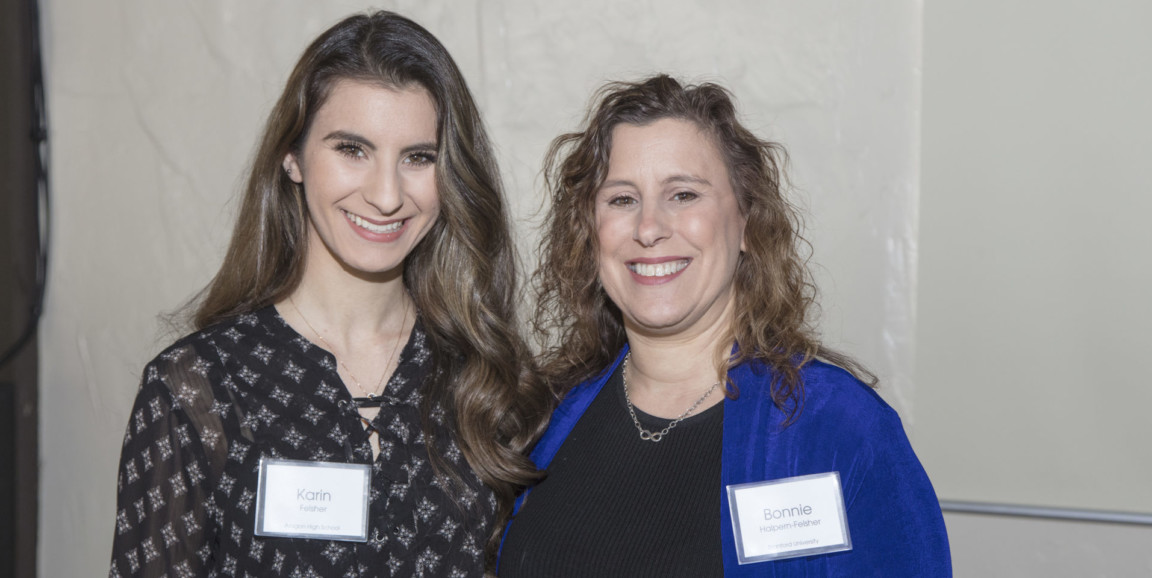Karin Felsher keeps an eye out for nicotine in her high school, from kids smoking into their backpacks to teens exchanging smoking videos on Snapchat.
When she started seeing students with a new and very popular kind of e-cigarette called the JUUL, she told the person she knew would care most: Stanford developmental psychologist Bonnie Halpern-Felsher, PhD, founder and executive director of the Tobacco Prevention Toolkit.
Also known as her mom.
"Ever since I was a little kid, she would show me her own research and tell me all the things that she knows about tobacco and cigarettes and how bad they are," Karin, a 17-year-old senior, said. "I do whatever I can to help my mom because I care about her work."
In this case, Karin's intel was key. Halpern-Felsher credits her daughter as one of the first to alert her to the significance of a new teen vaping trend. Within weeks, Halpern-Felsher and her team had updated the toolkit's online curriculum with a unit on JUULs, and the California Department of Education had distributed the new toolkit information to schools.
"The faster we can get something up, the faster we can counter that marketing and that misinformation," Halpern-Felsher said.
Both mother and daughter spoke about youth tobacco use at a recent luncheon conference co-hosted by Halpern-Felsher and the CVS Health Foundation, one of the toolkit's funders. At the gathering, researchers, educators, policymakers, advocates and others discussed statistics, trends and prevention strategies.
Halpern-Felsher told the audience she began laying the groundwork for the toolkit around 2009, in an effort to provide schools with a more comprehensive tobacco prevention program. Since its launch in September 2016, the curriculum has evolved to include new nicotine products, but the approach has remained constant.
"It's really to talk to youth about manipulation that's going on," Halpern-Felsher said. "When I say to a youth, there are 400,000 smokers dying each year, and the tobacco industry is... pointing to you to replace the next smoker who dies, that really makes youth wake up."
Used by physicians, community groups and others in addition to educators, the toolkit has been accessed nearly 70,000 times from around the world, including in Switzerland, Mexico, Kenya and China, Halpern-Felsher said. Her team conducts trainings throughout the country, and she estimates that teachers have presented the information to hundreds of thousands of students. The toolkit recently secured funding to add information on hookahs, cigars and smokeless tobacco, and to create foreign-language translations. It also received a grant from the California-based Tobacco-Related Disease Research Program to study the toolkit's impact.
"Preliminary data from schools suggest that the toolkit is influencing positive changes in knowledge, attitudes, and some changes in behavior," Halpern-Felsher said.
A consultant with the California Department of Education, another toolkit funder, said it's popular in California schools because it addresses the latest trends in nicotine-delivery - like the JUUL - quickly by pushing out updates online. "To have something that is so dynamic is going to make a big change on campuses," John Lagomarsino said at the conference.
In the week after the JUUL unit was added, page views jumped, Halpern-Felsher said.
Karin, who hopes to follow her mother's footsteps as a psychologist, told the audience that her peers could use the education.
"Teenagers, yes, they know about JUULs, but they don't know about JUULs," she said. "They don't know that there's so much nicotine in them that when they smoke one JUUL pod, they're smoking an entire pack of cigarettes."
Photo of Karin Felsher (left) and Bonnie Halpern-Felsher by Douglas Peck / Lucile Packard Foundation for Children's Health




